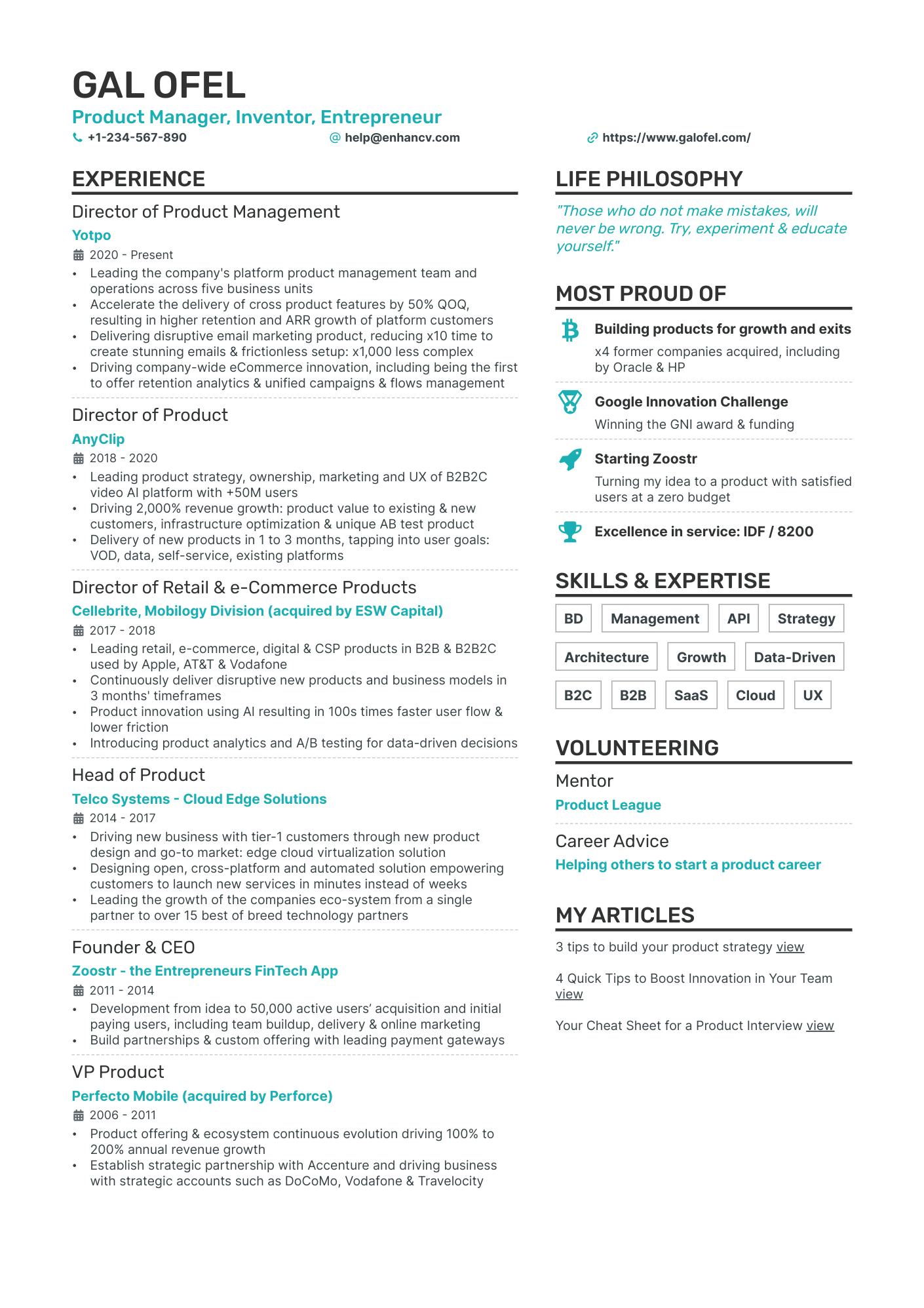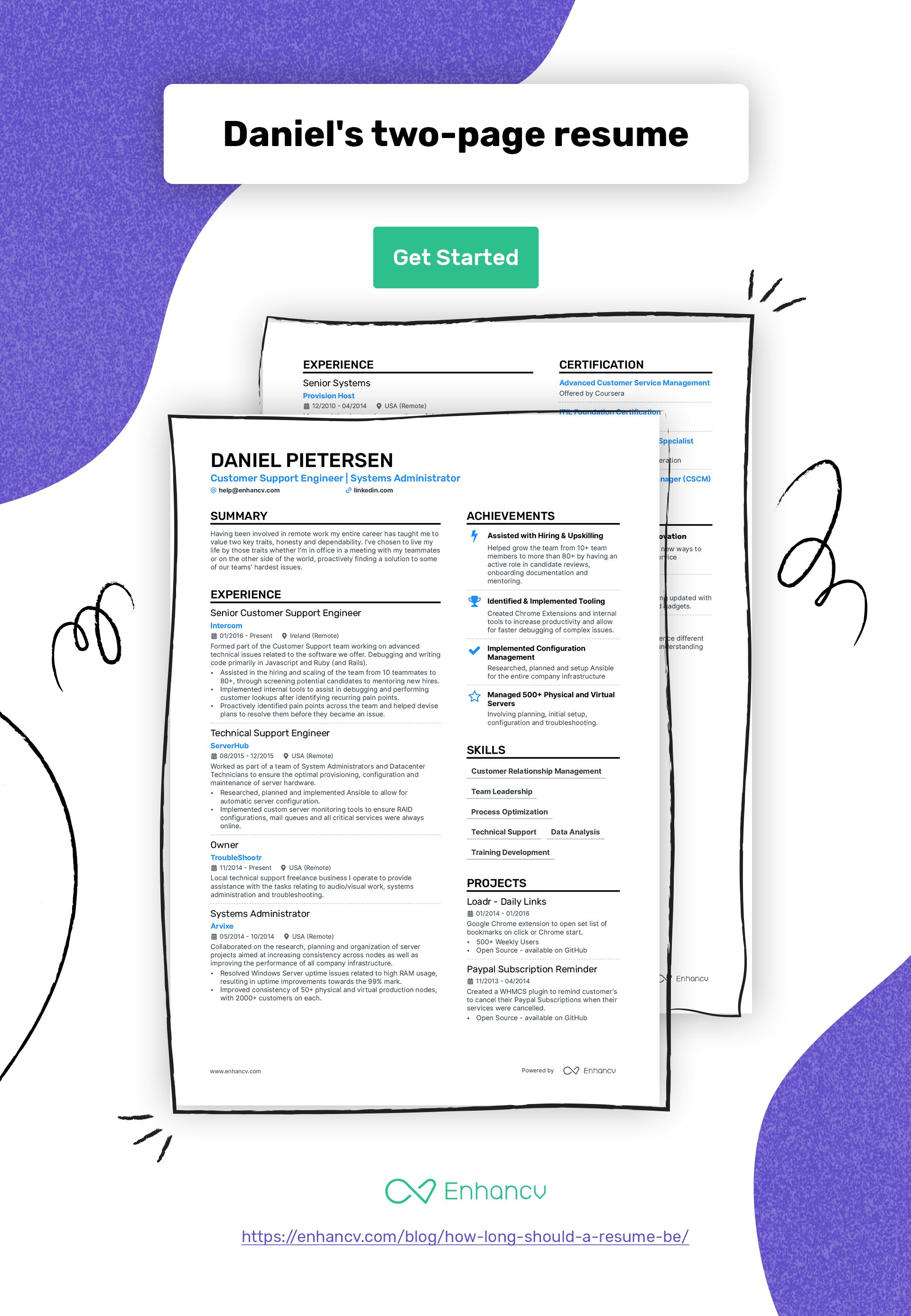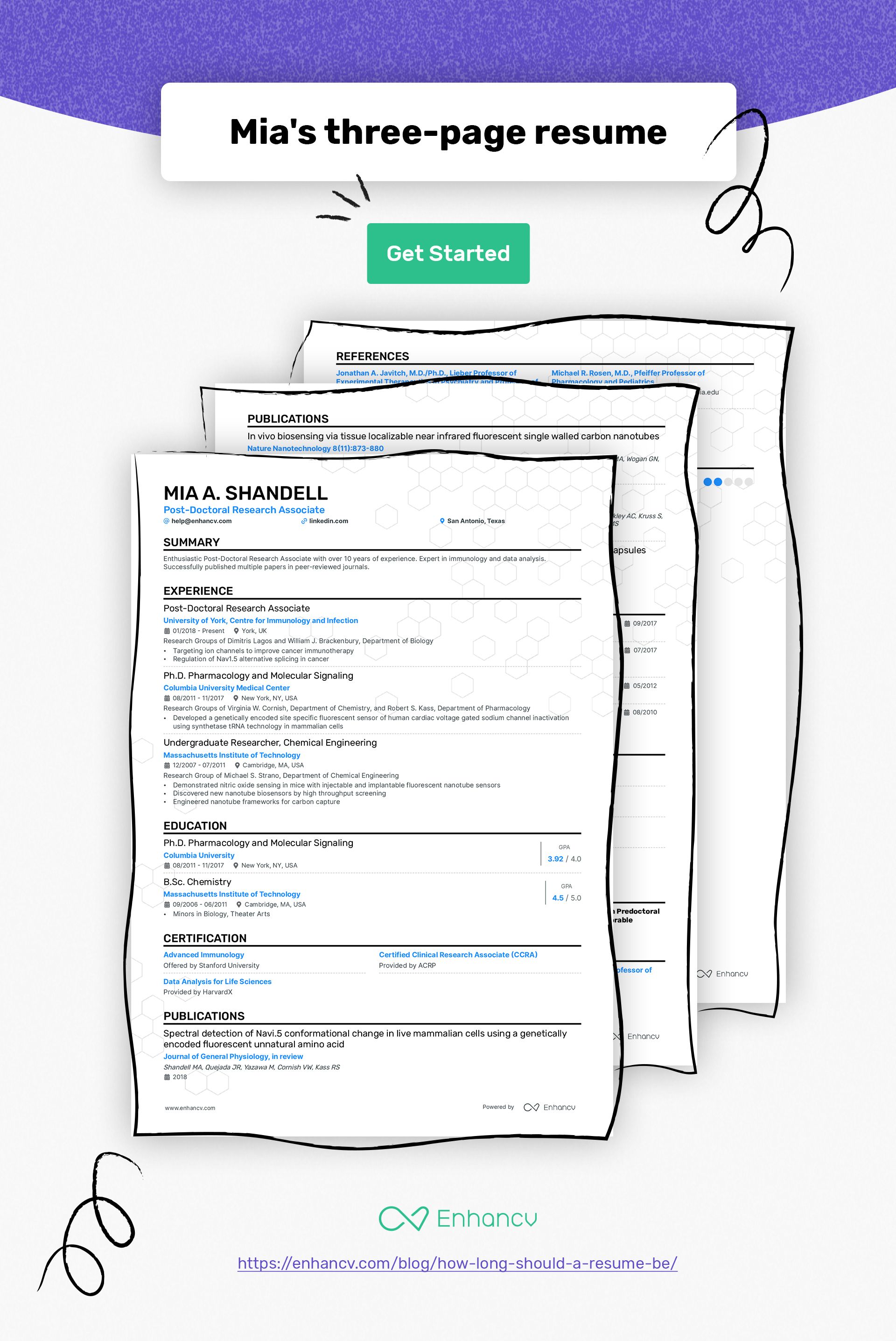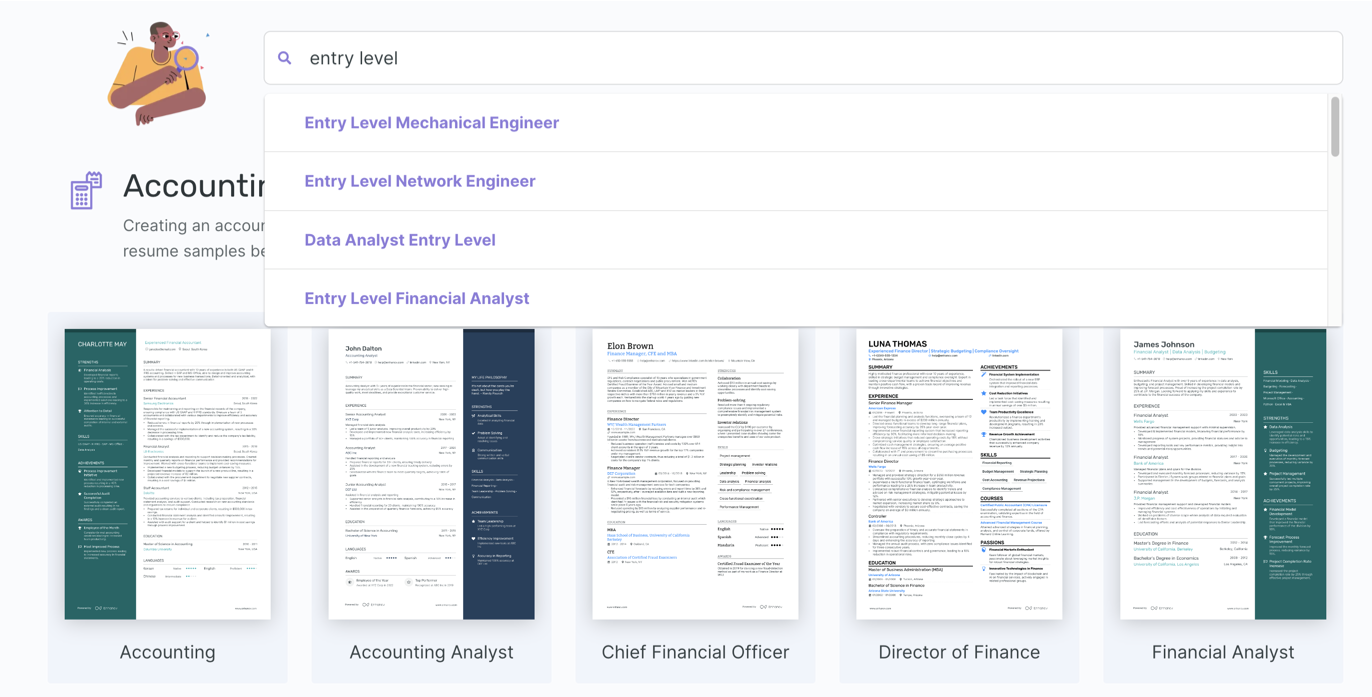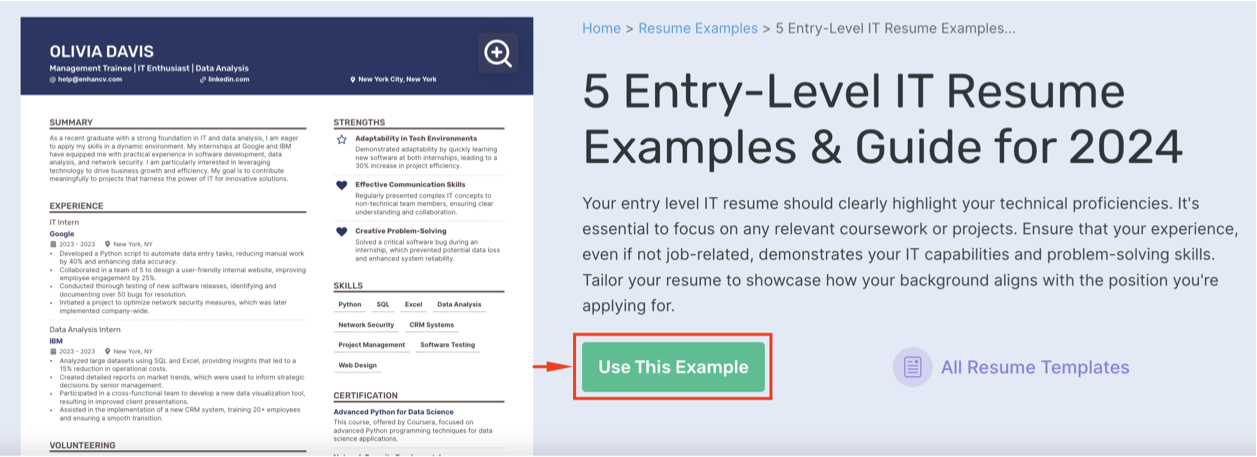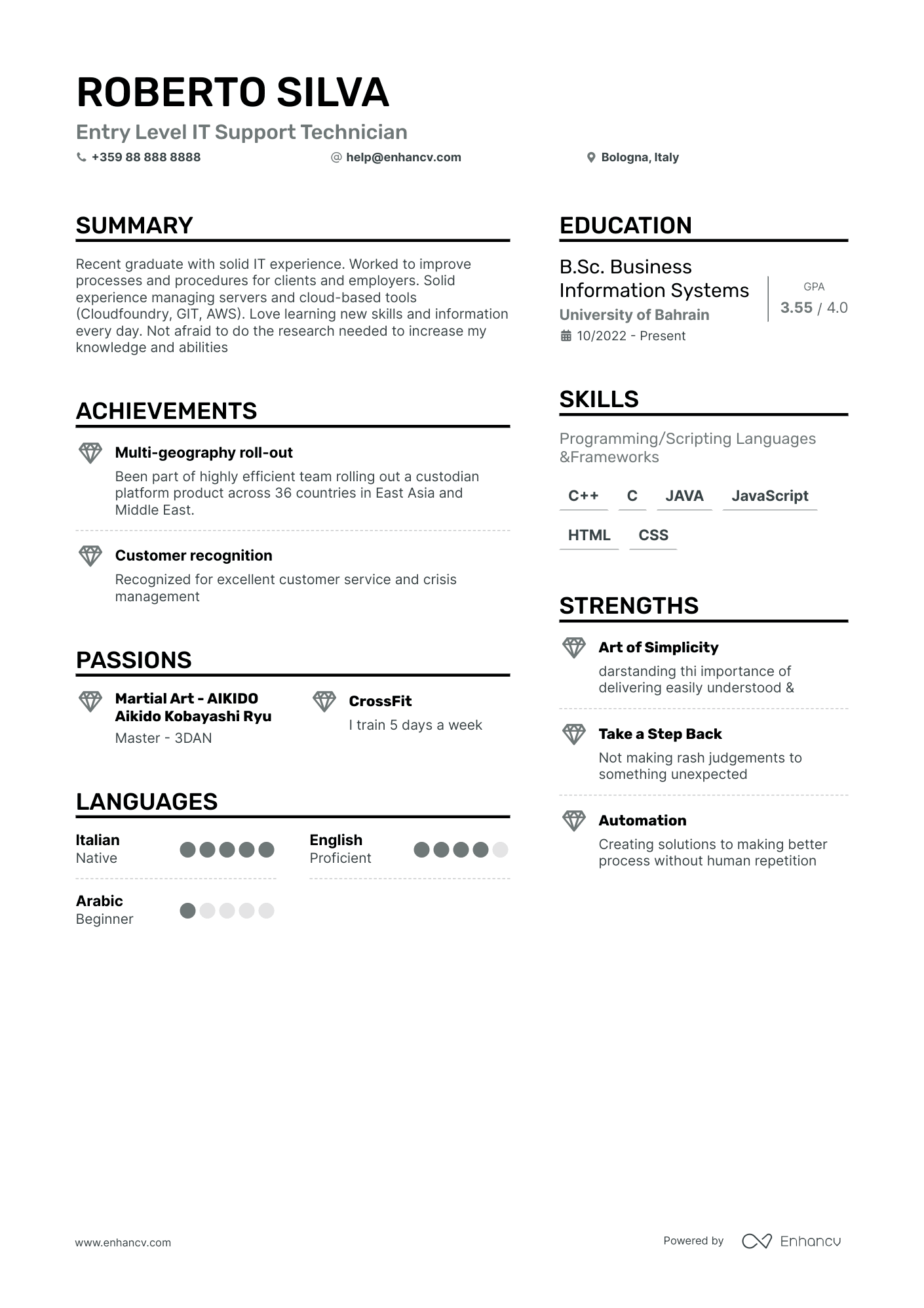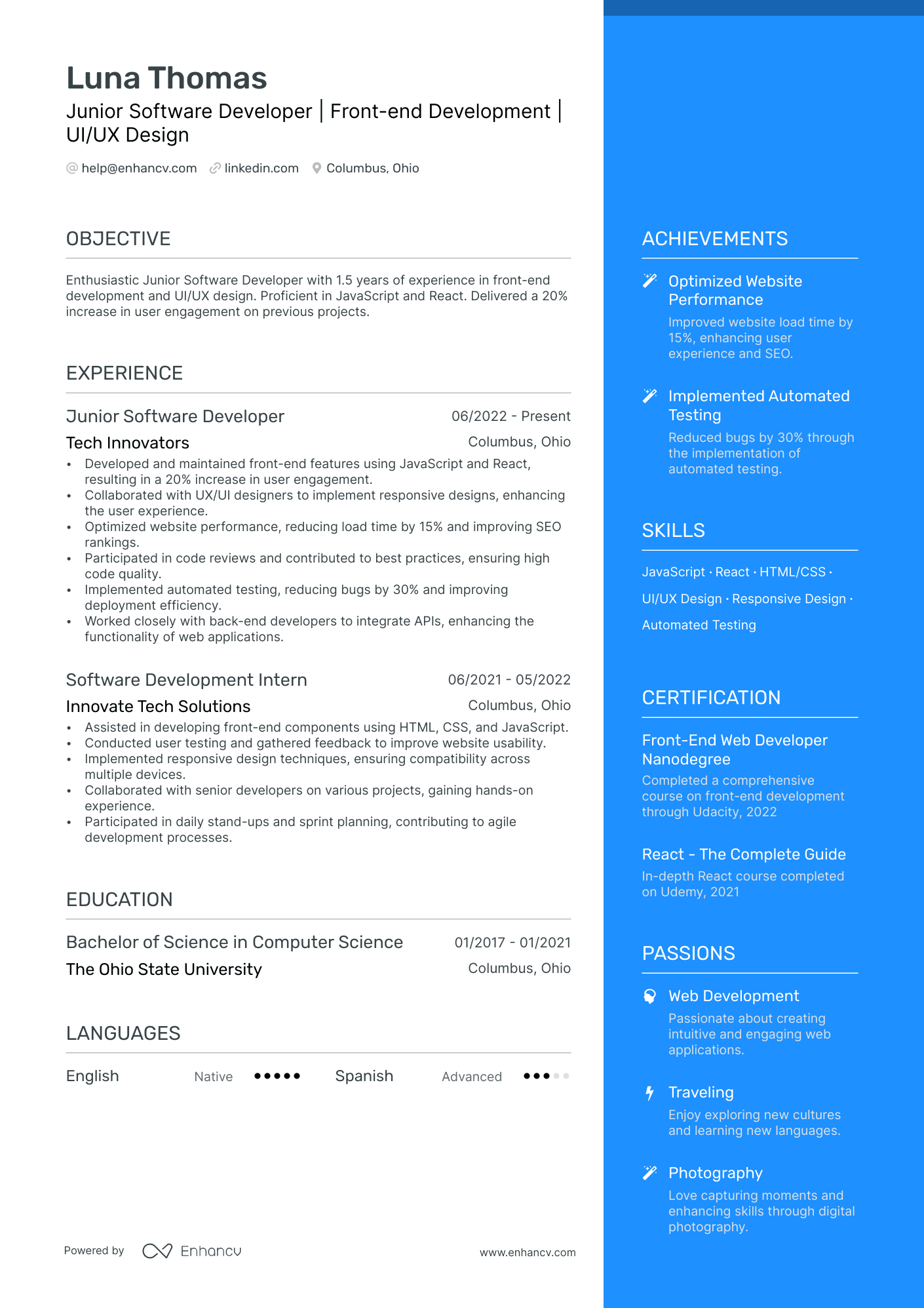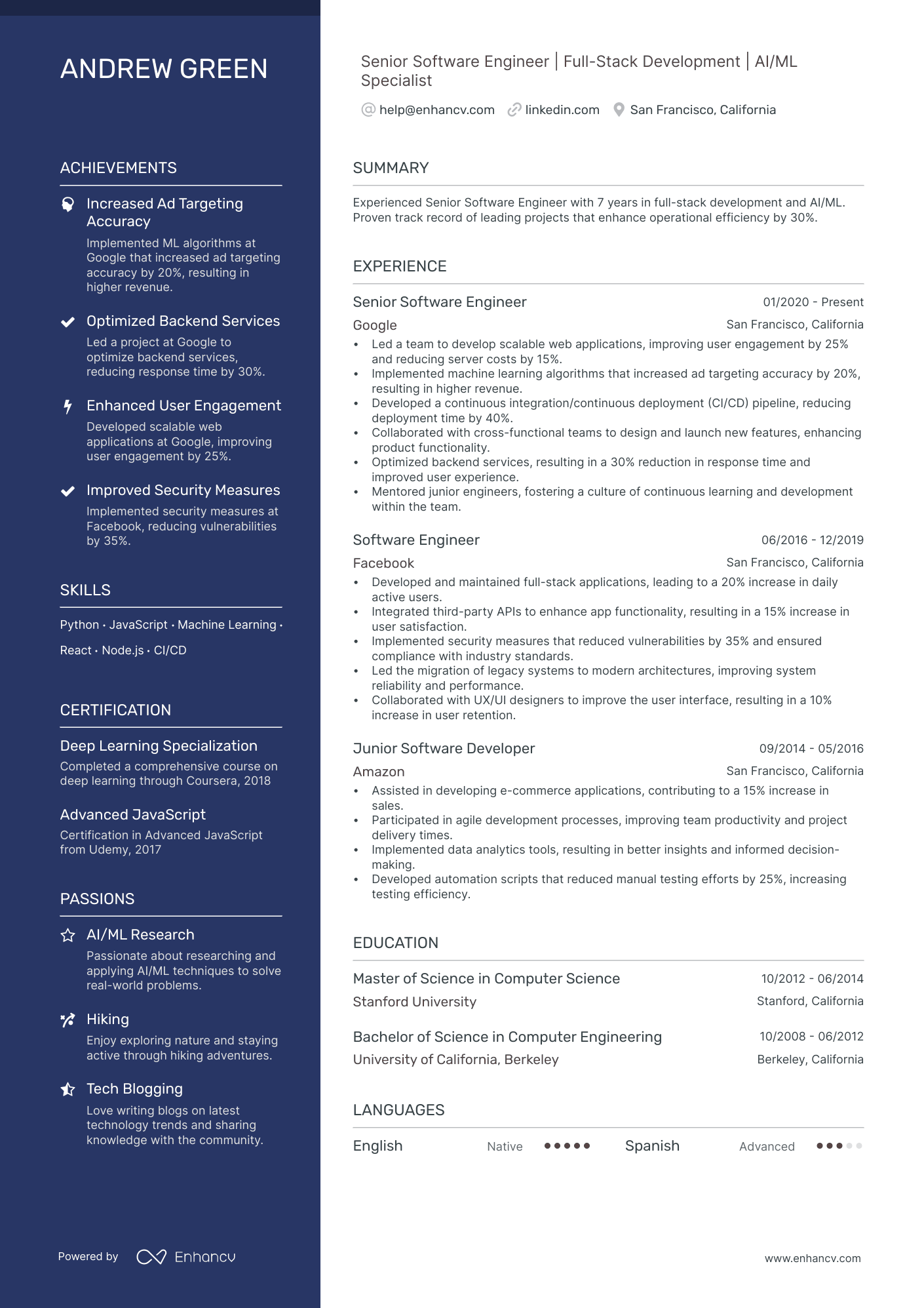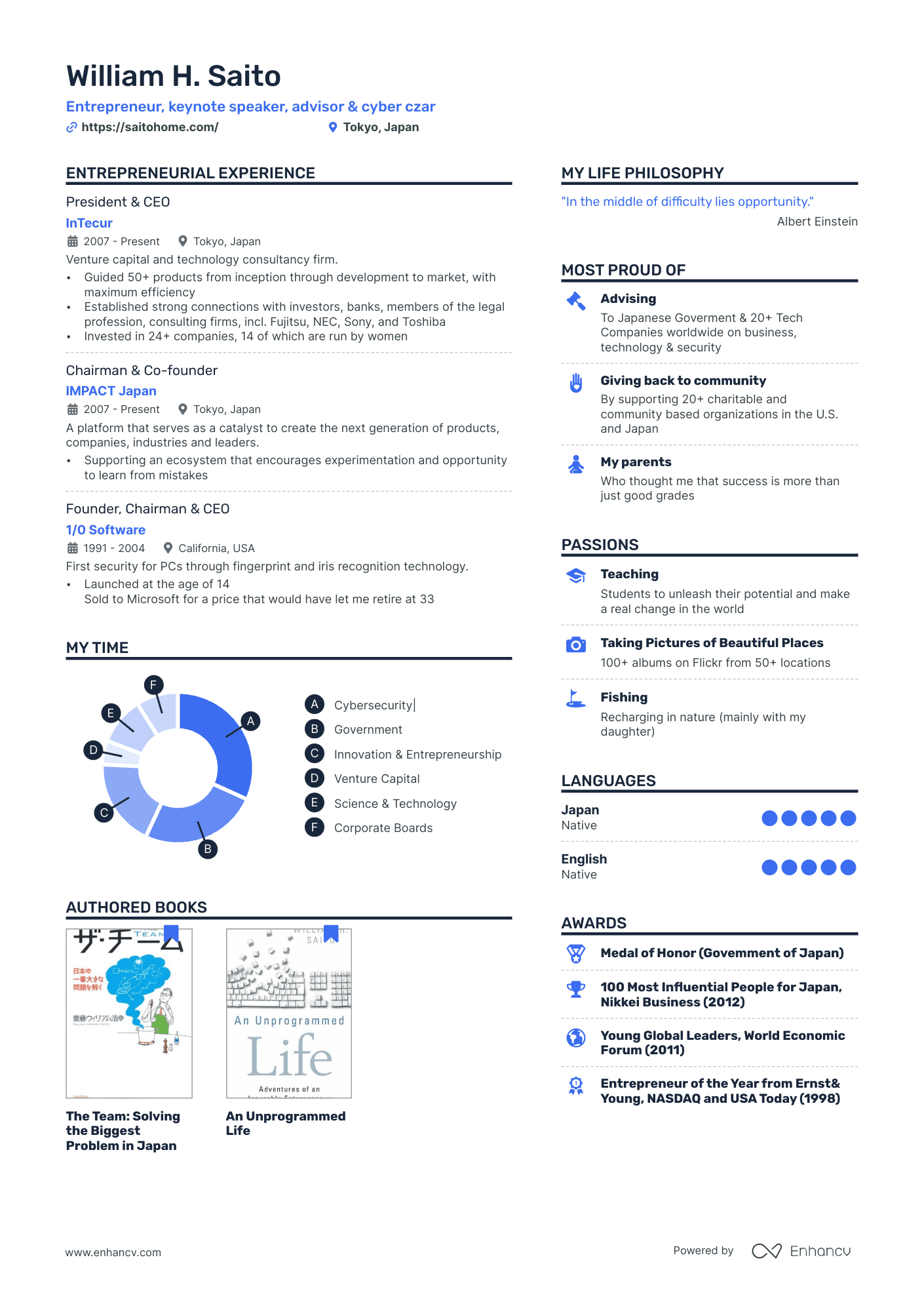How long should a resume be? One page or two? This is a common dilemma for professionals with extensive experience trying to fit everything onto a single page. It's natural to have questions about resume length.
What if you have a lot of relevant experience and need more space to describe it?
If you have a work history that goes back 25+ years, is three pages okay?
Unfortunately, you can find arguments online for just about any length if you look hard enough.
To provide clarity, we’ve analyzed the resumes of real users hired at competitive companies such as Spotify, Booking.com, Verizon Digital Media Services, Amazon, Intercom, and more. Instead of throwing opinions around, this guide answers all your questions about resume length based on facts.
So let's get straight to the point and address the question that concerns everyone applying for a job.
Key takeaways
- Looked at the typical traits of one page, two page, and three + page resume.
- Answered the who, why, what, and how questions of a resume.
- Ensured all of my experience is specific, relevant, and measured.
- Determined the significance of each item included on my resume and believe removing any section would negatively affect my chances of being hired.
- Consulted other successful resumes to see how others have crafted their resumes for inspiration.
- Used Enhancv’s builder to present all of this information in a sleek way and have capitalized on their unique sections to stand out.
How long should your resume be?
The ideal resume length varies by experience and industry. For most, a one-page resume works well, especially with less than 10 years of experience. However, those with extensive experience in fields like academia, engineering, or senior management may benefit from a two-page resume to detail achievements and skills. Rarely, a three-page resume is acceptable for academic CVs or senior executives.
Don't miss the opportunity to find a proven resume example for your specific job position. From there, building your resume and seeing what works is simple and easy. Best of all, it’s free to use!
I've got 20 years in the recruiting industry and looked at thousands of resumes. This tool creates a unique and fresh looking resume. The tool works great and is intuitive and easy to use. If you need to update your existing resume, haven't created one yet, or it's been several years, this tool makes that daunting task much easier and the result looks great!
Jeremy Sigler’s review in Trustpilot's Enhancv page
Why are there so many opinions about resume length?
Unfortunately, there’s no best answer.
The hiring landscape has changed considerably in recent years. Not even 20 years ago, keeping your resume down to one page was both a strategic and cost-effective move (i.e., cutting down on printing costs).
Going even further back in time (as far as Kiplinger’s Changing Times 55’ issue on job seeker advice), you’ll read that keeping your resume to a single page is your best option.
Two pages are also acceptable. But, anything longer makes it too difficult for employers to go through.
Today, these worries are less pronounced. In fact, there’s a growing trend of recruiters preferring two-page resumes over single-page ones.
According to an article in CNBC, it’s found that hiring managers are 2.3 times more prone to select a two-page resume format over the one-page resume. No matter what the candidate’s professional level is, it doesn’t make a big difference.
So why do people still argue for a one-page resume?
In one word: relevance. Every resume has an audience. But, not everyone will have the same opinion. And, that’s why it’s difficult to assume what the ideal resume length is.
Some recruiters and hiring managers will follow the one-page rule to the letter, while others will think the rule is useless. To help overcome this difficulty, it’s best to research the hiring practices of the organization you’re applying to and see the common traits associated with page lengths.
How far back should a resume go?
One question on your mind might be how far back should a resume go in regards to work history.
As mentioned, it depends on where you are in your career and how much work experience you have. These are the factors that vary for every candidate, which can determine how long your resume should be—that’s why it can be difficult to assume the best answer.
To get a better understanding of how where you are in your career can match your resume length, see below!
One-page resume
In general, it's always a good idea to keep your resume to a single page. While it may seem challenging in some cases (as we'll show below), it’s absolutely possible.
Recruiters often look at resumes for less than 7.4 seconds. Having a long, drawn-out document might be the difference between the ‘No’ and the ‘Maybe’ pile.
Besides, you don’t hear this often but you can indeed fit everything important into a one-page resume, even if you have 10+ years of experience. In our one-page resume breakdown post, we back this up with real-life examples.
Here are some scenarios where a single-page resume is your best bet:
- Recent graduate with limited work experience.
- Your first job or internship.
- Transitioning to a new career and highlighting relevant skills concisely.
- Applying for entry-level positions that don't require extensive experience.
- Minimal work experience with only a few positions to summarize.
- Frequent job changes.
- Freelancers and contractors shining a light on key projects and clients.
- Targeting a specific job, focusing only on relevant experiences and skills.
- Working in an oversaturated market where recruiters are unlikely to read more than a page.
Enhancv stats on average resume word count
The typical resume is 1-2 pages long, with one-page resumes having an average of 287 words and two-page resumes averaging around 506 words.
Two-page resume
As we mentioned, you should always aim to keep your resume to one page. But there are specific situations where a two-page resume is reasonable.
Check the list below:
- Experienced professional with robust technical knowledge.
- Balancing work experience and cultural fit.
- Made a significant impact in previous roles.
- Bringing valuable, yet unrecognized, experience to the company.
- Extensive work and volunteer experience.
- Multiple relevant educational achievements.
- Applying for mid-level positions.`
- Including required sections on the resume.
Stats on average resume length
According to MarketSplash, about 60.6% of job seekers use one-page resumes, 29.7% use two-page resumes, and fewer than 10% use resumes that are 3 pages or longer.
Three+ page resume
Not often, but sometimes a three-page resume is justified. Here are some situations where you might need that extra space:
- Academic roles requiring detailed lists of publications and research.
- Jobs involving extensive research projects and presentations.
- Long careers with multiple leadership roles and major projects.
- Medical professionals with detailed records of education and certifications.
- Academic CVs with comprehensive details of academic achievements.
What more to consider for resume length?
Before we take a closer look at the case studies for different resume lengths and why it works, your resume needs to answer five simple questions:
- Who are you?
- What relevant experience do you have?
- Why are you motivated for this position?
- How will you make an impact in your role?
- What are your accomplishments and qualifications?
These five questions will help determine your resume's length and consider the hiring manager's perspective. By answering who you are, the recruiter can match your work experience with their needs. Additionally, they’ll gain insight into your personality and potential cultural fit.
Showing your motivation for your role ensures that HR can see you’re not just looking for any job—you want this specific one.
Most importantly, your potential impact will entice the recruiter most as it directly relates to their performance and business goals. To do this, always quantify past experience to illustrate your value.
That being said, let’s get into Enhancv’s case studies of how a one-page, two-page and three-page resume got candidates hired in even the most competitive situations.
Case study: Gal’s one-page resume
Gal has over 10 years of experience and is looking for a new job in business development. He has started his own company, led software solutions, and speaks three languages, giving him plenty of options. Many people think so much experience can't fit into a one-page resume.
But Gal knew that fitting everything onto a single page would make a strong impression, precisely because everyone expects a two-page resume. So, he made sure to include all the important details on just one page.
He successfully told the recruiter who he was, why he was motivated for this job, the experience he’d bring, and how he would make an impact.
Amidst the fog like Gal, you will hear different opinions about how long your resume should be. For someone with over 10 years of experience, most professionals and job seekers around will expect to have a two-page resume.
That doesn’t necessarily mean you should.
Since Gal’s resume was one page, it was completely different to the rest of the other applicants. In other words, it was a gateway to standing out from the crowd and getting his voice heard among the chaos.
Be like Gal and get hired for the competitive job posting at your dream company by using Enhancv’s free resume builder. Use the same one-page formula now below!
Why was one page the right choice?
Let’s dive into why Gal chose a one-page resume:
Catching attention
Gal had all the experience in the world, but his aim wasn’t to list as much as possible in his work experience section, skills section or education section.
His aim was to catch the HR’s attention.
Gal’s one-pager gives a quick, non-exhaustive record of his work history and talents. He knew once he secured an interview he could get the job. Catching the attention of the recruiter with a succinct resume was therefore vital.
PRO TIP
You can include a short bio on the top of your resume in a bold color to quickly catch the recruiter’s attention and save space.
Staying concise
There was no need to include multiple pages as Gal’s descriptions were concise and to the point.
He went into detail on his most recent job and kept other relevant experience down to two bullet points. His industry expertise was conveyed quickly using one-word visuals too.
Business development is rooted in your ability to communicate and do so as effectively as possible. Gal knew recruiters would be looking for a short few words on how he has led previous businesses to success.
PRO TIP
Describing your previous experience with one to two bullet points will allow you to focus on your key achievements and save space.
Case study: Daniel’s two-page customer support resume
Daniel had been involved in remote work for over two years.
Two years of experience doesn’t sound like a lot. But the impact he’s had during that time was huge, which left him with a lot to say.
The nature of his work requires more detail on who he is and his ability to fit company culture despite distance. It was also necessary to explain the reasons why he’s gravitated towards remote working too.
His less than 10 years of experience would typically lead us to a one-pager. However, in this case, a two-page resume was needed.
The hiring manager wants to see the value you can provide for the company. Even if you don’t have as much experience as Gal does and you’re someone like Daniel, you want to talk about the results you were responsible for.
When the employer sees what you’re capable of, it’s more likely they’ll hire you for the job posting since they understand how valuable you are.
If you’re like Daniel and you want a proven two-page resume template to secure your new career, click the button below to get started for free!
It only requires minimal effort. It’s that simple!
Why was adding a second page the right choice?
Here's why Daniel chose to go with a two-page resume:
Showing you who he is
HRs are interested in culture fit to identify whether employees’ practices and passions align with the employer’s goals.
Daniel opens his resume with a short summary of his career and later goes on to provide useful links where the HR can learn more about him (e.g., his website).
Using a two-page resume, he didn’t have to worry whether including these details would detract from his previous experience.
PRO TIP
You can use a ‘Most Proud of Section’ with Enhancv to highlight aspects of your personality and your career experience all in one on your resume.
Is it bad to have a 2-page resume?
Working in technical support and engineering obviously requires a certain level of technical expertise.
Hiring managers need to clearly see the extent of Daniel’s knowledge on his resume. This means exploring the projects he’s worked on and the technologies he has experience with. He dedicates just under two full pages explaining these and highlights his own projects under a Projects section.
This shows the extent of Daniel’s knowledge along with his initiative and ability.
PRO TIP
You can utilize Enhancv’s ‘Technologies Section’ to briefly mention all of your technical skills, software, and languages you’ve used before.
Case study: Mia’s three-page research assistant resume
Mia has been working in immunology for many years.
From her undergraduate work to her current postdoctoral work… Her drive to make a difference in the world has produced publications, presentations, and awards. In her pursuit of postdoctoral research, demonstrating her expertise in the field is an absolute must.
This raises the common question: Is a three-page resume too long? In academia, the answer is often no. Academic resumes have unique expectations—they require detailed sections on research, publications, and presentations, all while maintaining a streamlined and professional design.
To meet these standards and effectively showcase her extensive accomplishments, Mia’s three-page resume became essential, balancing the need for depth with clarity.
So far with all the case studies, have you noticed any similarities?
Firstly, they’re modern resumes that stand out. Above all, it’s the resume design and the way it highlights key information such as your certifications and different types of skills by using appropriate visual aspects. This is what makes them so compelling for the hiring manager.
Chances are, the recruiters at your company aren’t used to seeing a modern resume like this. So, making an impression and getting your foot in the door isn’t difficult.
If you’re unsure what to write and trying to cope with writer’s block, Enhancv makes the entire resume-building process easier for you.
When you’re using any of these proven examples, you have a resume in front of you that’s gotten someone hired in the most competitive spaces. More importantly, they could just be like you.
Meaning, you can easily get ideas and replace the contents with your own work experience and tailor it for the job opening so it works for you.
These resume templates are free.
Why not get hired by spending only a few minutes building your resume with Enhancv?
If you already have a resume, take advantage of our intuitive AI resume checker for free. It performs 16 crucial checks to ensure your resume is ready to get you interview callbacks.
Is your resume good enough?
Drop your resume here or choose a file. PDF & DOCX only. Max 2MB file size.
Why was a three-page resume the right choice?
In this case, a three-page resume was suitable due to Mia's specific academic background.
Readable format
Mia spaced her experience across the 3 pages to keep from overpacking text in one area while also facilitating detailed discussion where necessary.
Keeping a consistent format meant defined margins, bold headings, and a simple design.
There’s little room to cut down on details in a resume for postdoctoral research – every author, every long word, every reference is needed. Restricting her resume to one to two pages would have required leaving off key works.
PRO TIP
Enhancv’s simple templates give your resume a clean-cut and sleek finish!
Is it too long?
Discussing your expertise in immunology isn’t something that happens in a few bullet points.
Most publication titles alone are over 10 words long – you can’t just shorten them down. However, this doesn’t mean that Mia was frivolous in her space usage. Her research has been grouped into eras (Undergrad / PhD) with the main points discussed.
Mia keeps things short and sweet, but she has a lot to mention. When applying for a postdoc, it’s better to give them everything.
PRO TIP
You can include an industry experience section on an Enhancv resume that gives a quick visual indicator of all your key industry-specific abilities!
How to determine the resume length according to the industry
Here's a guide to the best resume length for 20 different industries. Customizing your resume to industry standards can increase your chances of making a strong impression.
Technology and IT
- One-page resume: Highlight your technical skills, projects, and relevant experience. Ensure you include key achievements and certifications.
Academia and Research
- Three pages or more: Detailed CVs are common, listing publications, research projects, teaching experience, and academic achievements.
Creative Fields (Design, Marketing, etc.)
- One-page resume: Showcase your creativity with a visually appealing format. Add a portfolio link and underline key projects.
Finance
- Two-page resume: Focus on professional experience, certifications, and educational background. Precision and clarity are crucial.
Healthcare
- Two-page resume: Include detailed information about education, certifications, clinical experience, and relevant skills.
Law
- Two-page resume: Focus on professional experience, certifications, and educational background. Ensure clarity and precision.
Engineering
- One-page resume: Underscore technical skills, projects, and relevant experience. List certifications and key achievements.
Sales and Business Development
- One-page resume: Emphasize results and achievements, such as sales figures and growth metrics. Include relevant experience and skills.
Education
- One-page resume: Detail teaching experience, certifications, and educational background.
Human Resources
- One-page resume: Focus on your experience in managing personnel, training, and development programs. Highlight certifications and key accomplishments.
Retail
- One-page resume: Emphasize relevant experience, customer service skills, and sales achievements. Keep it concise and focused.
Manufacturing
- Two-page resume: Underline technical skills, safety certifications, and relevant experience. Include key projects and achievements.
Hospitality
- One-page resume: Focus on customer service experience, relevant certifications, and key achievements in the industry.
Non-Profit
- One-page resume: Emphasize relevant experience, volunteer work, and mission-driven accomplishments. Highlight key projects and achievements.
Construction
- Two-page resume: Underscore technical skills, safety certifications, and relevant project experience. Display key accomplishments.
Marketing and Advertising
- One-page resume: Showcase your creativity and strategic thinking. Include key projects, campaigns, and results.
Consulting
- One-page resume: Emphasize your problem-solving skills, relevant experience, and key projects. List certifications and key achievements.
Real Estate
- One-page resume: Demonstrate sales achievements, certifications, and relevant experience. Include key projects and accomplishments.
Telecommunications
- One-page resume: Focus on technical skills, relevant projects, and certifications. Highlight key achievements and experiences.
Transportation and Logistics
- One-page resume: Emphasize relevant experience, certifications, and key projects. Explain logistical achievements and skills.
What’s the ideal resume length for the hiring manager?
Resume length is the difference between an experienced candidate and an irrelevant candidate. If your resume is too long, it’s a complete waste of time for the recruiter to go through.
On the other hand, if a resume is too short they won’t get an overview of your suitability for the position. It’s good practice to scope out the hiring preferences of the company you’re applying to. This will allow you to tailor your resume to them and give you the best chance of getting noticed and called for an interview.
Let’s take a look at this a bit further by breaking down an entry-level resume and an executive-level resume.
Entry-level resume
As a student, graduate, or someone who’s just finished high school with a solid GPA, it can be nerve-racking to think about applying for your first job.
Most of the time, your resume is going to be one page. It makes sense since you don’t have as much work experience as other candidates might have. Though, you may still tell yourself to push for a two-page resume.
However, it’s not as effective as you think. In fact, a one-page resume is more powerful. It just depends on the approach you take and how you do it.
Instead of reinventing the wheel, it’s smarter to see what already works.
So, first, open the resume examples page on Enhancv and search for an entry-level position.
Next, you’ll be taken to a page that has a complete guide for creating an entry-level resume.
Now, click on the “use this example” button:
Great! You now have full access to a proven resume.
Feel free to see what works and use this as inspiration to create your own resume. If you want to replace the content and personalize it, go for it!
See the impact of this one-page resume?
While it’s not two pages and might not seem to have a lot of information, it contains everything necessary. Since it’s fluff-free, minimal, and straight to the point—it leaves a bigger impact on the hiring manager skimming through your resume.
While it’s important to use the right keywords, it’s not just about what you say—
it’s how you say it.
With an entry-level resume, you should aim for a one-page resume. As long as you’ve included everything you need alongside the right resume sections and details, it’s way more compelling than a forced two-page resume.
Early career resume
This time, let’s look at an early career resume. You might think it’s tough to make an impression with just a few years of experience, right?
Well, the reality is, a one-page resume is perfect for early career professionals.
When building your resume with Enhancv, we always recommend that early career professionals keep it to one page. Why? Because it’s more focused and impactful.
For example, take a peek at Enhancv’s early career resume template:
Instead of cramming in every job and task, it’s more effective to spotlight the most relevant experiences and accomplishments.
If you can fit your key skills, projects, and achievements on one page, it shows you can prioritize and communicate efficiently.
A one-page resume demonstrates clarity and relevance. Plus, it’s more memorable. Hiring managers can quickly review a concise resume, making it more likely to stand out among other candidates.
Mid and Senior-level resume
Now, let’s talk about a mid and senior-level resume. You might think with all your extensive experience, you’d need a long resume, right?
Actually, a one-page resume is usually ideal for mid and senior-level professionals, unless you've handled exceptionally significant and high-profile projects.
When creating your resume with Enhancv, we suggest mid and senior-level candidates aim for one page. Why? Because it lets you provide a detailed yet concise overview of your career, including key achievements and leadership roles—without overwhelming the recruiter.
Check out Enhancv’s mid and senior-level resume template:
Instead of detailing every single job and responsibility, it’s more powerful to underscore your major accomplishments.
By fitting your significant career milestones and achievements into one page, you show you can provide a comprehensive yet concise summary of your experience.
A one-page resume can also prove professionalism and depth of experience, as well as being more effective.
A well-structured one-page resume allows hiring managers to see your full range of skills and accomplishments, making it clear why you’re a strong candidate for senior roles.
Executive resume
Now, let's focus on an executive resume. You might be expecting this type of resume to be at least two pages long, right? The reality is that a one-page resume also works.
When building your resume with Enhancv, we advise all job seekers and professionals to create a resume that’s one page long. The reason is that it’s more impactful and can say a lot more than a two-page resume.
Let’s take a look at Enhancv’s executive resume template:
Instead of just plainly telling, it’s more powerful to show.
If you’re able to keep your entire career and work experience concise and demonstrate that in a single page, it says a lot about you. It shows a high level of efficiency and expertise.
On top of that, it’s more effective and meaningful. Your resume is more likely to be memorable because of how different it looks and how easy it is to identify key pieces of details (thanks to the visual features of your resume)!
Still wondering whether or not this will work? There’s only one way to find out.
Through our case studies above, we've broken it down and shown you why. We also have candidates for whom Enhancv’s resume templates have gotten hired at even the biggest companies, such as Amazon and Tesla.
The best way to get started with anything is to see what already works.
If you haven’t been following these steps, start now by browsing through our 1800+ resume samples to unlock your career potential!
It’s the best way to get started!
How to shorten my resume?
You might be thinking, how could I fit everything into a single page? One section of a resume might need more space than another, which then restricts me from fitting everything I want into it.
For example, if you’re using a functional resume and have different skills, such as:
- Computer skills
- Communication skills
- Language skills
- Soft skills
- Hard skills
Even if you’re using a different resume layout (e.g. chronological resume), there’s always the thought of wanting to include more. It’s good to mention additional experience, but it can sometimes have the opposite effect.
To learn how to shorten your resume to two pages or one page, use the following key tips:
- Group your early career into one section.
- Restrict your previous work experience to one or two bullet points.
- Use a short bio in lieu of a personal resume summary or objective statement.
- Use a ‘Most Proud Of’ section to intertwine achievements with cultural fit.
- Choose an optimal font type—Rubik, Roboto, Calibri, and Lato take up less space compared to Arial.
- Consider a smaller font size—10.5 p is still great for content, while headers can be somewhere between 13 and 15 p.
- Trim down unnecessary elements, such as references, and a lengthy address.
- Remove any filler words, such as “the”, “an”, “a”, “like” or “that”.
- Experiment with the document margins until you optimize the use of the resume’s white space. You can decrease it to 0.5”.
A good question to ask yourself when reducing your resume length is: Will omitting this significantly affect my chances of getting an interview?
If the answer is no, you can remove it.
Another underrated strategy is to proofread and edit your resume. Sometimes, you can rephrase and describe things better using fewer words.
You can do all that manually or let our free resume checker do it for you. The choice is yours.
Is your resume good enough?
Drop your resume here or choose a file. PDF & DOCX only. Max 2MB file size.
3 Additional tips to have in mind
To maximize your resume’s effectiveness, we have some extra tips to help you impress hiring managers:
- Match keywords from the job ad to increase the chances of passing ATS filters.
- Start each bullet point with dynamic action verbs like "achieved," "managed," and "developed" to make your accomplishments more impactful.
- Save your resume as a PDF and use standard headings to ensure ATS compatibility.
In conclusion
Truth is, there’s no perfect answer. There are too many factors to be considered to allow for a simple determination. Nonetheless, the strategies and topics discussed will help you in making the decision.
As we’ve learned from Gal’s case study, sometimes rules of thumb don't fit your situation. Daniel’s story shows us that sticking to one page isn’t always an advantage, and Mia shows us that in some cases, the recommended length is the best length.
As long as you’ve done the research and followed this guide, there is no right or wrong answer.
Make one that's truly you.





